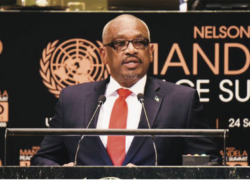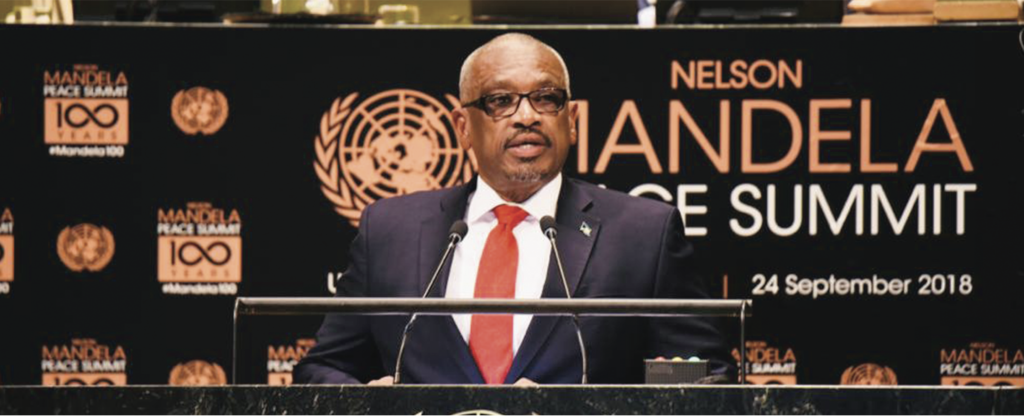
 Prime Minister, Dr. the Hon. Hubert A. Minnis told the delegates at the United Nations yesterday that “peace and justice are as indivisible as the bond of human dignity, which transcends race, creed, ethnicity and every circumstance of birth amidst the exuberant diversity of humanity.”
Prime Minister, Dr. the Hon. Hubert A. Minnis told the delegates at the United Nations yesterday that “peace and justice are as indivisible as the bond of human dignity, which transcends race, creed, ethnicity and every circumstance of birth amidst the exuberant diversity of humanity.”
Dr. Minnis was at the United Nations, New York, on the Occasion of the Nelson Mandela Peace Summit, during which he highlighted the role The Bahamas played to bring about the release in 1990 of Mr. Mandela from long imprisonment under apartheid in South Africa.
The Prime Minister was thankful to the UN for convening the Nelson Mandela Peace Summit in support of global goodwill. The Peace Summit honoured the centenary of Mandela’s birth at this 73rd regular session of the UN General Assembly.
“Amidst the wars, conflicts, violence, injustice, hunger and bitter hatreds, which stalk the global commons, we find hope in the commemoration of the centenary of the birth of a noble soul, whose witness to reconciliation and peace is an eternal wellspring for humanity,” the Prime Minister said. “Peace and justice are as indivisible as the bond of human dignity, which transcends race, creed, ethnicity and every circumstance of birth amidst the exuberant diversity of humanity.”
The Prime Minister recalled that at The Eighth Commonwealth Heads of Government Meeting (CHOGM) held in The Bahamas in 1985, host Prime Minister the Late Sir Lynden Pindling, was a leading figure in the struggle for equality and majority rule in The Bahamas, who also led the charge for the release of Mandela.
That Meeting produced the Commonwealth Agreement on South Africa, also known as The Nassau Accord.
The Prime Minister noted that The Nassau Accord pressed for the then government of South Africa to enter into negotiations with the black majority to end apartheid. The Accord also called on South Africa to end the occupation of Namibia.
“The struggle for peace and justice is universal,” Prime Minister Minnis said.
He noted that in 2014, former Governor General Sir Arthur Foulkes penned a letter to the students of The Bahamas on the attainment of Majority Rule and the emancipation of The Bahamas in 1967.
Said Sir Arthur in his letter to the youth: “That event removed the last psychological shackles from the minds of many; it shattered false notions of superiority or inferiority; it created the foundation upon which to build a society with opportunity for all; it unleashed the hitherto brutally-suppressed but powerful entrepreneurial instincts of a people.
“It freed many Bahamians from the fear of one another because of differences of colour or ethnic origin.”
Prime Minister Minnis said as the world reflects on the centenary of Nelson Mandela’s birth, and the 70th anniversary of the Declaration of Human Rights, “the most enduring witness and testimony we may offer, is the manner of courage of a man of nobility and grace, who was prepared to give his very life in the service of humanity.”


